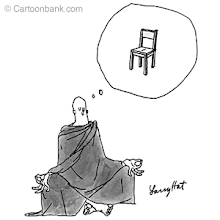Tuesday, July 20, 2010
Harvey Pekar
Dow Jones Reprints: This copy is for your personal, non-commercial use only. To order presentation-ready copies for distribution to your colleagues, clients or customers, use the Order Reprints tool at the bottom of any article or visit www.djreprints.com
See a sample reprint in PDF format.Order a reprint of this article now
ARTS & ENTERTAINMENT
JULY 20, 2010
His Life Was Some Serious Books
By RICHARD B. WOODWARD
Harvey Pekar's mother always told him: "Prepare for the worst, so if it happens you won't be surprised." Even though the inevitable worst finally happened last week when he died at age 70, the retired file clerk from Cleveland had plenty of reasons in the last years of his life to overcome his chronic gloom and reflect that things had turned out a lot better for him than his mother would have expected.
Not only did his long-running series of autobiographic comic books, "American Splendor," transform the genre with a psychological honesty that earned him comparisons to Dostoevsky and Chekhov, but Pekar became a genuine celebrity after the 2003 feature film named after his series, starring Paul Giamatti as Pekar and Cleveland as itself, won the Grand Jury Prize at Sundance.
The film put enough money in his pocket that he could have left for a happier climate. But Pekar, showing a loyalty not imitated by some of the city's sports teams and marquee players, stayed in Cleveland. His writing conveyed at once a helpless sense of despair about the world and an almost sentimental attachment to home.
Comic books before Pekar were spun from whimsy and fantasy and intrigue. Marketed to adolescents, they featured wisecracking animals and superheroes in skintight outfits. Pekar's comics, originally self-published, did away with these commercial blandishments. His storylines were built around mundane incidents he had observed in his neighborhood and at his menial job as a clerk at a Veterans Administration Hospital.
The son of first-generation Jewish immigrants from Poland, he adapted better to America than they did, but just barely. As related in his longest confessional story, "The Quitter," a self-sabotaging temper and bouts of clinical depression always seemed to undercut his stumbling progress toward peace of mind.
Many of his smartly edited vignettes from his life were not the normal stuff of comedy. His trial with fatal illness became the subject of his 1994 opus, "Our Cancer Year," illustrated by Frank Stack and co-written with Pekar's wife, Joyce Brabner.
Pekar broke into print as a jazz critic, good training for a life of low pay and mass indifference to your intellectual pursuit. His first published article, on trumpeter Fats Navarro, appeared in The Jazz Review when he was only 19 years old. Martin Williams, co-editor with Nat Hentoff of this prestigious and short-lived (1959-61) journal, credited Pekar for pulling his coattails about the emerging talents of Wayne Shorter and other postbop musicians.
Jazz cemented a friendship with illustrator R. Crumb, and Pekar's fame might never have traveled beyond northern Ohio had his early stories not been inked by this 1960s cartoon superstar of the counterculture. Their musical tastes didn't really coincide. The beatnik Pekar promoted avant-garde trends; Mr. Crumb tuned out music recorded after about 1935. But they shared a disgust with an America that looked down on popular art forms it had invented, namely jazz and newspaper comics.
They met in Cleveland in 1962, collaborated on a strip in 1972 and then on Pekar's annual books, first published in 1976. In an introduction to a 1986 collection of these works, Mr. Crumb recalled his friend from those years as "seething, intense, burning up, always moving, pacing, jumping around . . . just like a character out of Kerouac."
In the '80s, literary critics discovered Pekar. The anguish and rage of his autobiographic character were likened to those of Dostoevsky's resentful "Underground Man" in an influential 1983 piece written by Marshall Berman for the Village Voice. Pekar's portrait of Cleveland's disintegrating economy also had affinities with regional fiction—William Kennedy's novels of Depression-era Albany, N.Y., and Raymond Carver's hardbitten tales of the Northwest—which was being celebrated at the time. Pekar's gift for turning his Jewish angst into sadsack comedy, based on the minute irritations of daily life, may even have inspired Larry David's contributions to "Seinfeld": George Costanza bears more than a passing resemblance to Harvey Pekar.
The comic-book writer was notorious enough by 1986 that, for the next couple of years, he became a somewhat regular guest on "Late Night With David Letterman." The eight tense confrontations between these two grumpy Midwesterners, neither entirely at ease in his own skin, often made for enthralling television and can still be enjoyed on YouTube.
Pekar claimed in a 2001 article in the Austin Chronicle that he accepted the invitation in order to publicize his work in front of a national audience. He and his wife "got a free trip to New York, a couple of free nights in a hotel, and some bread." The personal comics he created operated on thin profit margins. He could ill afford to pass up chances to promote himself on broadcast television.
His books seemed far from his mind, though, in most of these televised appearances. The gleam in his eyes betrays how much he relished being the focus of attention. Boorishly scornful of talk-show decorum, he quickly alienated the studio audience by shouting over or ignoring his host's questions. He was like a wild animal that walks into a zoo and yet will not allow itself to be caged or petted. For a while, Mr. Letterman seemed to admire his guest's feral unpredictability. He would patronize the overmatched artist, trying to force him to express appreciation for the exposure.
"You come on because you like being with me, don't you?" he asked insincerely one evening. Pekar simply glared at him and growled, "I don't even know you, man."
Pekar finally bit the hand that fed him in a 1988 appearance, when he wore a T-shirt denouncing the labor practices of General Electric (the parent company of NBC) and called Mr. Letterman "a GE shill." Pekar was banned from the NBC show, and reappeared with Mr. Letterman only for a short stint in 1994 after the late-night host moved to CBS.
Pekar and Mr. Crumb generally sneered at the movies and television even as the careers of both benefited from the camera's communicative reach. Mr. Crumb's bizarre family life was the subject of a remarkable 1994 documentary by Terry Zwigoff. In 2001 Mr. Crumb also became one of the thinly disguised main characters in Mr. Zwigoff's 2001 feature, "Ghost World." Its warm reception, in turn, made it less risky to turn "American Splendor" into a film.
Against all odds, neither man watered down his art as he found wider success. Even stranger, both of these perennial misfits in middle age found wives who could tolerate them. Pekar was divorced twice but wooed Ms. Brabner to join him in Cleveland. Their improbable romance and adoption of a 9-year-old girl, Danielle Batone, provided the backbone to the plot of "American Splendor." Both women survive him.
Pekar remained a cranky left-wing zealot who thought that "Babbitt-like people," such as Mr. Letterman and Ronald Reagan, explained "why the world is so screwed up." It's a shame his reactions to the many fond obituaries he has received won't appear in one of his comics. He would probably be amazed to learn that he is being eulogized in the pages of this newspaper, while grumbling that any story about his unique contributions to American literature deserved much more space.
Mr. Woodward is an arts writer in New York.
Copyright 2009 Dow Jones & Company, Inc. All Rights Reserved
This copy is for your personal, non-commercial use only. Distribution and use of this material are governed by our Subscriber Agreement and by copyright law. For non-personal use or to order multiple copies, please contact Dow Jones Reprints at 1-800-843-0008 or visit
www.djreprints.com
Subscribe to:
Post Comments (Atom)






No comments:
Post a Comment